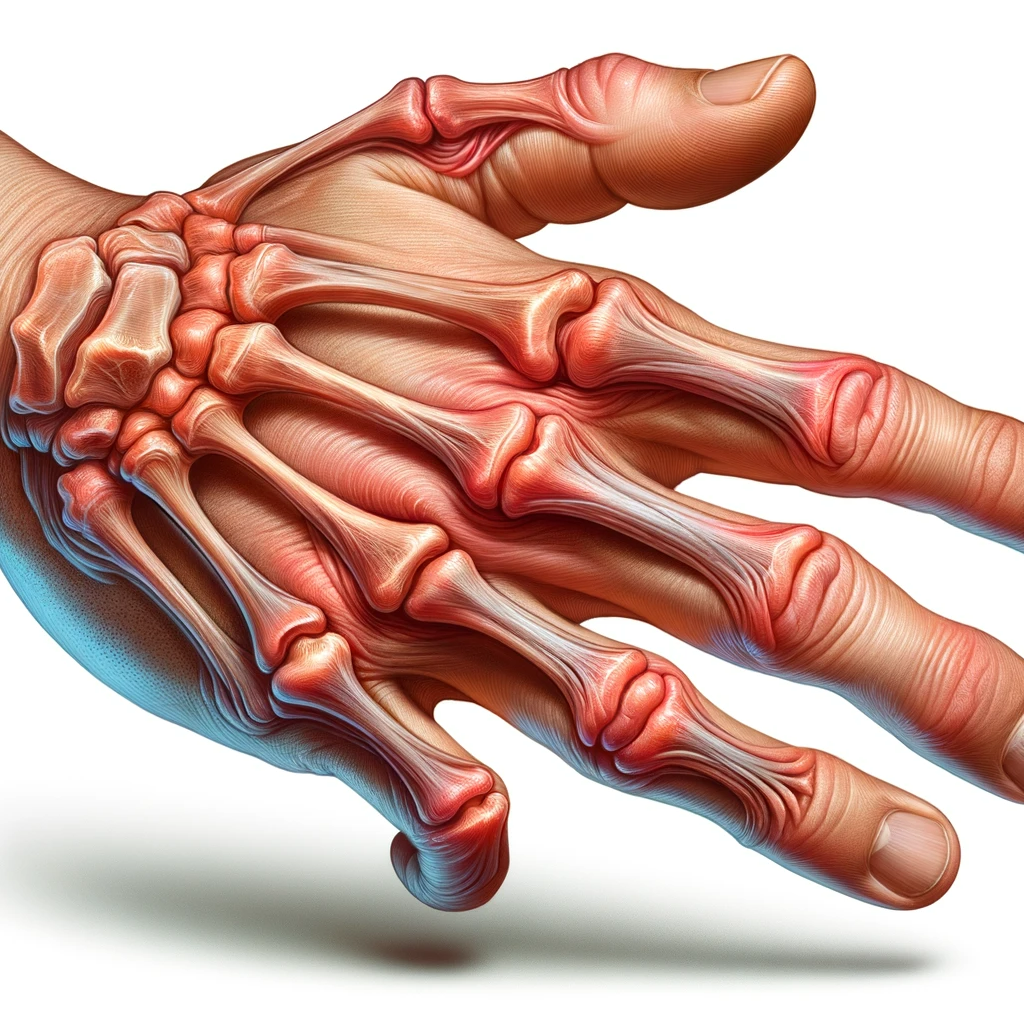Rheumatoid arthritis (RA) is an autoimmune disease that primarily affects joints but there is a marked association between rheumatoid arthritis and heart health because RA can also impact other tissues and organs, including the heart. While RA raises concerns about heart health, it doesn’t guarantee heart problems. People with RA can take practical measures to maintain heart health and prevent heart disease.
What is Rheumatoid Arthritis

Rheumatoid arthritis (RA) is an autoimmune type of arthritis where the immune system erroneously targets healthy cells. RA is characterized by joint inflammation and pain resulting from an improperly functioning immune system that attacks the synovium, the lining of the joints. It causes pain and possible deformity in the affected areas. RA predominantly impacts joints in the hands, wrists, knees, and ankles. Beyond the joints, chronic inflammation from RA can affect other body areas, including the heart, lungs, circulatory system, and eyes.
Rheumatoid Arthritis and Heart Health
RA’s chronic inflammation raises the risk of heart disease. This type of inflammation damages blood vessels and can cause arterial plaque buildup. The buildup results in the blood vessels narrowing, increasing the risk of heart attack or stroke.
Cytokines, proteins linked to immune system activity, play a role in both RA’s attack on joints and blood vessel damage in cardiovascular disease. Here are some more ways rheumatoid arthritis affects the heart.

However, RA is also associated with an increased risk of cardiovascular diseases, which can affect the heart. Here are some ways in which rheumatoid arthritis can impact the cardiovascular system:
- Inflammation: RA is characterized by chronic inflammation, and this systemic inflammation can affect the entire body, including the cardiovascular system. Inflammation can contribute to the development and progression of atherosclerosis, a condition where the arteries become narrowed and hardened due to the buildup of plaque.
- Atherosclerosis: The chronic inflammation associated with RA can lead to the development of atherosclerosis. Atherosclerosis increases the risk of heart attacks and strokes by restricting blood flow to vital organs, including the heart.
- Increased Risk of Cardiovascular Disease: People with rheumatoid arthritis have been found to have a higher risk of cardiovascular diseases, including coronary artery disease, heart attack, and heart failure, compared to the general population. The exact mechanisms linking RA and cardiovascular disease are not fully understood, but inflammation is believed to play a significant role.
- Rheumatoid Vasculitis: In some cases, RA can cause vasculitis, which is inflammation of the blood vessels. This can affect blood flow and lead to complications such as blood clots, aneurysms, or other vascular problems.
- Effects of Medications: Some medications used to treat rheumatoid arthritis, such as nonsteroidal anti-inflammatory drugs (NSAIDs) and corticosteroids, may also impact cardiovascular health. For example, long-term use of NSAIDs may increase the risk of cardiovascular events.
Shared Risk Factors Between RA and Heart Disease
RA and heart disease share several risk factors:
1. Obesity
Obesity may increase the risk of developing RA. Joint soreness from RA can hinder physical activity, leading to weight gain. Obesity also relates to inflammation and other heart disease risk factors like high blood sugar and blood pressure.
2. High Blood Pressure
Those with RA often experience higher blood pressure due to limited exercise, less elastic arteries, and certain RA medications like steroids. The inflammation associated with RA also contributes to higher blood pressure levels.
3. Metabolic Syndrome
Metabolic syndrome is a very common condition in people with RA. It includes symptoms like high triglycerides and cholesterol, high blood pressure, and high blood sugar.
RA uniquely affects blood fats. People with RA usually have lower LDL (bad cholesterol) levels but also lower HDL (good cholesterol) levels and higher triglycerides, which can increase heart disease.
5. Smoking and Its Impact on RA and Heart Health
Smoking significantly increases the chances of developing RA and can worsen the severity of joint damage. It is also a major cause of heart disease. Smokers with RA are 50% more likely to develop heart disease compared to non-smokers with RA.
Rheumatoid Arthritis Treatments
There are several RA treatments, and they focus on:
- Alleviating symptoms.
- Inhibiting or minimizing inflammation to achieve remission.
- Preventing damage to joints and organs.
- Minimizing long-term complications.
- Improving function and overall well-being.
To achieve these, doctors employ early, aggressive treatment, targeting remission and maintaining tight control over inflammation.
How to Prevent Heart Disease Risk for Rheumatoid Arthritis Patients?
Individuals with rheumatoid arthritis (RA) are highly susceptible to heart disease. However, this risk can be avoided with some effective prevention measures under proper medical guidance.
Sticking to medication routines prescribed for RA is necessary for preventing heart-related complications. Disease-modifying antirheumatic drugs (DMARDs) effectively reduce RA-related inflammation and may decrease the risk of heart disease.
The European League Against Rheumatism (EULAR) advises screening every five years for heart disease risk factors for those living with RA. Lifestyle adjustments can also significantly reduce heart disease risk:
- Consuming a balanced diet rich in vegetables, fruits, and whole grains.
- Engaging in at least 150 minutes of aerobic exercise weekly.
- Following the self-care tips for RA.
- Maintaining a moderate weight.
- Avoiding or quitting smoking.
- Following the prescribed medication regimens for heart disease prevention, such as statins.
The Takeaway on Rheumatoid Arthritis and Heart Health
RA’s association with increased heart disease risk is primarily due to inflammation and shared risk factors. While the risk increases, individuals with RA can adopt various measures to lower their chances of developing heart disease.

